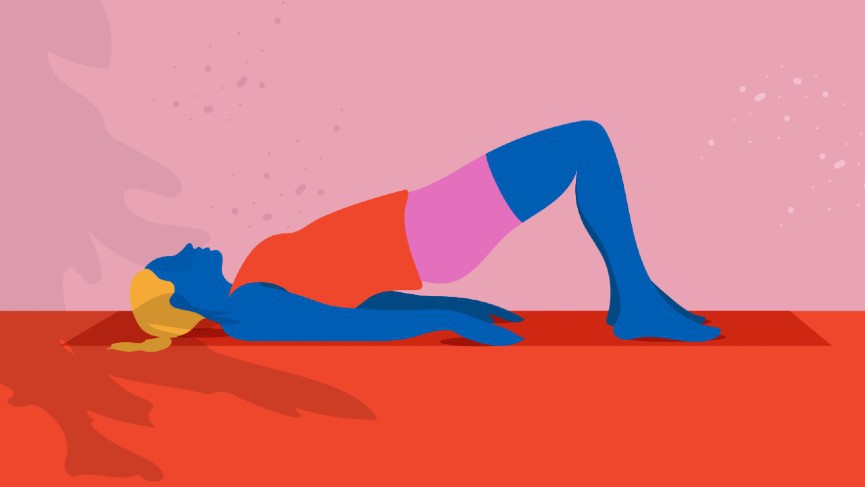Impact of Stress on The Pelvic Floor

This article was medically fact-checked by Consultant Obstetrician and Gynaecologist Dr. Shree Datta.
Your pelvic floor deserves more credit. It works day in and day out, to quite literally, hold it all together.
Not only does your pelvic floor help facilitate vaginal birth, make sex pleasurable and orgasms possible, it also acts as the gatekeeper for holding in or releasing all things that come out of that region. Yes, that includes pee, poop, and farts. There’s no being shy here. Most importantly, this incredibly strong and complex network of muscles supports all the internal organs that lie in your abdomen. It basically acts as a hammock for your innards.
Just like with any other body part, stress can have a significant impact on the health of your pelvic floor. Here at Intimina, we care about your reproductive health! Which is why we’re going to dive into the effects of stress on your pelvic floor.
What is ‘Stress?’
Stress can mean a whole lot of different things, especially when referring to the body. What kinds of stress can impact the pelvic floor?
Physical Stress
Having a human body means wear and tear is normal. Normal everyday tasks can slowly break down the body over time, a normal part of aging. Certain physical stressors like birth and injuries may weaken the pelvic floor.
As with any injury or physical strain, injuries in the pelvic floor can cause scar tissue as part of the healing process. This overaccumulation of scar tissue can lead to difficulties with conception, sexual wellbeing, and overall feelings of comfort.
Mental and Emotional Stress
When you’re in a tense situation or are feeling nervous, do you ever find yourself clenching your butt and the surrounding muscles? Well that my friend, is your pelvic floor.
While this is a totally normal response to everyday woes and worries, when this is done all the time as a response to chronic stress, it can lead to all sorts of pelvic floor disorders from pain during sex, pelvic organ prolapse, lower back pain, to bladder dysfunction and constipation.
Mind-Body Connection
When it comes to the mind-body connection, it’s nearly impossible to distinguish the difference between physical and mental stress. As any emotional or mental stress someone experiences, has a direct impact on their physical health – including their pelvic floor.
You’re probably familiar with the stress hormone, cortisol. While cortisol helps to regulate all sorts of bodily functions like metabolism, memory formation, and inflammation, an imbalance of it can wreak havoc on your body.
Recent research shows a correlation between female-bodied reproductive health disorders and pelvic floor pain.
Contrary to popular belief, chronic stress, especially from things like chronic pain, actually causes abnormally low levels of cortisol, not high levels. How does this work? When the body continuously releases cortisol as a stress response, it depletes the body’s ability to naturally create it. With the body exhausted of its resources, its ability to fight off infection, inflammation, and handle regular stressors is hindered.
These exhausted low levels were found in people with certain disorders that consequently affect their pelvic floor, like endometriosis, Vulvodynia, and chronic yeast infections.
Over time, this can lead to comorbidity with pelvic floor disorders that can cause incontinence, pain, and sexual dysfunction.
How to Support Your Pelvic Floor
Is the stress in your life causing pelvic floor pain or dysfunction of any kind? We’re here for you! With patience and time, people have been able to find deep healing and relief around pelvic floor disorders.
One of the first steps you can take is tending to your mental health and emotional well being. Balancing your brain, helps to balance the body, especially if you’re a chronic clencher.
What tools do you already have in your toolbelt to balance stress? Utilize those, and add in more when necessary. Some of our favorite stress relief tips are going outside, light exercise like yoga and dance, journaling, spending time with loved ones, masturbating, and therapy or counseling.
Another way to build conscious control over your pelvic floor muscles is through kegels. Like any muscle group, the pelvic floor benefits from working out. By strengthening your pelvic floor muscles, it can be easier to mindfully release and relax them when you find yourself over clenching while stressed.
Getting Help
If stress has caused further damage on your pelvic floor that’s interfering with your daily life, it may be time to seek outside help.
There are quite a few specialists out there who can help you with your pelvic floor pain or imbalance.
Pelvic floor physical therapists help to diagnose and provide practical tips and exercises to manage pelvic floor discomfort. They often work with people that have experienced birth trauma and other pelvic floor injuries.
Sexological bodyworkers, use techniques like a massage therapist would, yet they focus on the genitals and surrounding area. This practice helps to break up scar tissue, while helping to relieve pelvic pain and related disorders.
You may find help in approaching your stress through a holistic lens by seeing an alternative medicine provider like a naturopathic doctor or a Chinese Medicine Practitioner. These practitioners may use a variety of techniques like herbal remedies, changes in your diet, or acupuncture.
Healing is Possible
Stress is a normal part of life, but if your high-stress levels are negatively affecting your pelvic floor, healing is possible. We encourage you to take the steps to take control of your health and your life.
Facts checked by:
Dr. Shree Datta
Dr. Shree Datta is a Consultant Obstetrician and Gynaecologist in London, specialising in women’s health including all menstrual problems such as fibroids and endometriosis. Dr. Shree is a keen advocate for patient choice, having written numerous articles and books to promote patient and clinician information. Her vision resonates with INTIMINA, with the common goals of demystifying periods and delivering the best possible care to her patients
Written by:

Natasha (she/her) is a full-spectrum doula and health+wellness copywriter. Her work focuses on deconstructing the shame, stigma, and barriers people carry around birth, sex, health, and beyond, to help people navigate through their lives with more education and empowerment. You can connect with Natasha on IG @natasha.s.weiss.



